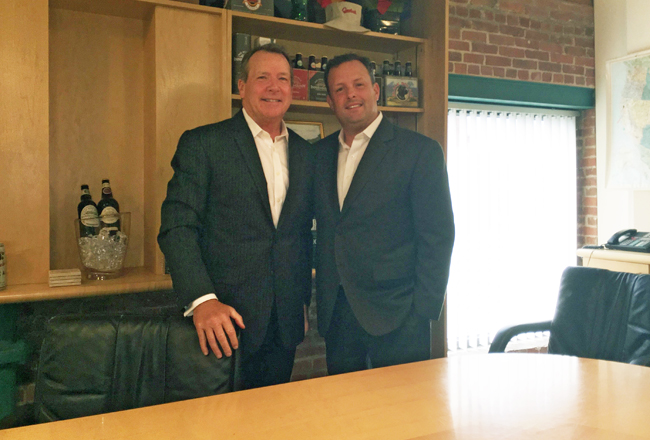Stamford distributor U.S. Beverage stays a family affair in a consolidating industry
In an industry increasingly marked by consolidation, Stamford”™s United States Beverage (USB) remains staunchly independent ”“ and intends to stay that way, according to company founder Joseph Fisch.
Although he has been approached with acquisition offers, “I created this company not to sell it, but to build it,” Fisch, USB”™s president and CEO, said at his 700 Atlantic St. office. The company in 2000 relocated from Darien to its 5,700-square-foot space in a changing industrial area of Stamford.

Now in its 20th year, United States Beverage is ranked by independent analysis firm IRI as the nation”™s leading independent beer importer and seventh-largest beer importer overall. Fisch said the company, which has 47 employees, has recorded 30 percent year-over-year growth for the past three years.
Since its launch, United States Beverage has grown from representing six brands to 14, including Canada”™s Moosehead, Scotland”™s Innis & Gunn, Spain”™s Estrella, and the Czech Republic”™s Czechvar. It also works with smaller craft beer and cider manufacturers such as 1911 Spirits in Central New York and Sonoma Cider in Healdsburg, California, as both a distributor and branding consultant.
“Helping a brand extend its presence nationally or even regionally is one of the most rewarding aspects of what we do,” Fisch said. “We work closely with them to determine what they want to do and how to do it.”
Making USB a family affair is Fisch”™s son and company vice president and general manager, Justin Fisch, who will likely take over when his father retires. The younger Fisch, who oversees USB”™s sales and marketing and is the primary contact for brewery suppliers, joined the company in 2003 after stints at Ogilvy & Mather and Mesa Distributing Co., a beverage distributor in San Diego. “The opportunity to join my father in a family-owned business was the most exciting option for me,” he said.
Following a 25-year career at Joseph E. Seagram & Sons, which culminated in a five-year stint as president of the Seagram Beverage Co., Joseph Fisch said watching Americans”™ growing taste for imported and craft beers led him to form USB in 1997.
Since then, the beer industry has been transformed by consolidations. Some 90 percent of U.S. beer production is now controlled by AB InBev and Molson Coors. Fisch said the number of distributors in the U.S. has been reduced by about 40 percent over the past 20 years, while retail has also become more centralized.
“Like everyone else, we”™re waiting to see what Amazon is going to do with Whole Foods,” he said.
The industry consolidations actually work in his company”™s favor, Fisch said. “It allows us to speak to more companies. With (multinational companies) purchasing a larger share of the marketplace, they can be very overwhelmed in some cases. We can help them with the process of building brands as well as managing their marketplaces for the better.”
Today U.S. beer distributors deliver nearly 3 billion cases of beer to more than 600,000 retail establishments, according to the National Beer Wholesalers Association.
Investment firm Harding Loevner reported in August that craft beer in the U.S. grew from a 3.6 percent market share in 2006 to 12.3 percent in 2016. Last year, a new craft brewery opened in the U.S. on average every 11 hours, according to the firm.
In Connecticut, the Brewers Association said that craft breweries grew from 16 in 2011 to 49 in 2016, with another 40 in development. The state”™s craft beer industry generated about $374 million in revenue in 2012 and grew to $569 million in 2014.
Although brewing volume in Connecticut rose 6 percent to 24.6 million barrels in 2016, the brewers group reported, that was a significant drop from the 13 percent growth in volume in 2015 and the 18 percent growth seen in both 2014 and 2013.
“The era of 18 percent growth rate is probably over,” said the trade group”™s chief economist, Bart Watson. “Having those growth rates in an industry of this size is impossible going forward.”
With the decline in beer consumption has come an increase in wine and spirits.
USB is carefully tracking such developments. Fisch said that having already entered the cider market, the company could also expand into wine and spirits, as well as energy drinks and bottled water.
Its focus, however, will likely remain on imported and craft beer. Fisch pointed to the recently announced deal wherein Heineken named USB as U.S. importer of to-be-determined specialty Heineken products, which could include brands from Europe, Latin America, South America, and Southeast Asia.